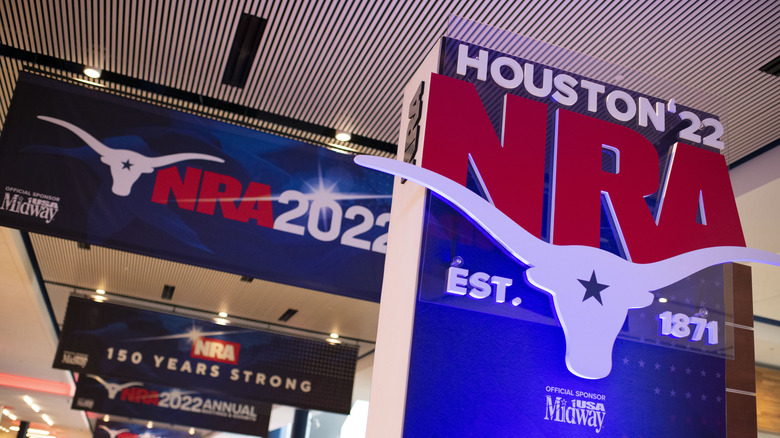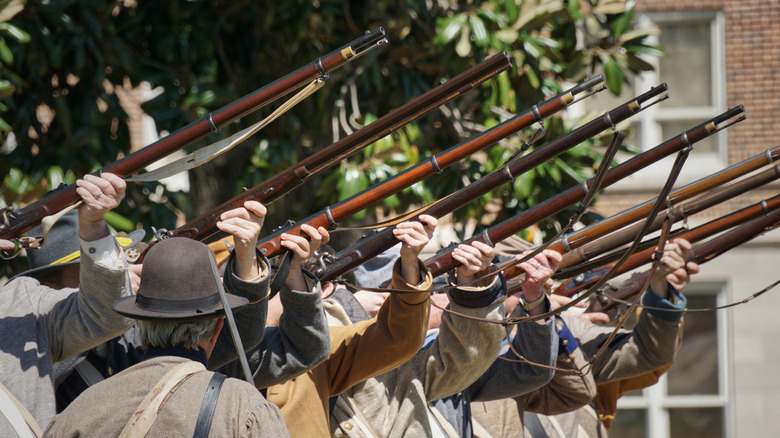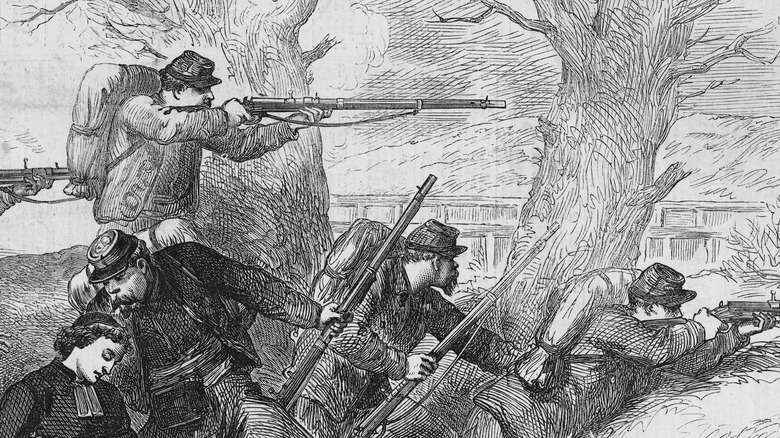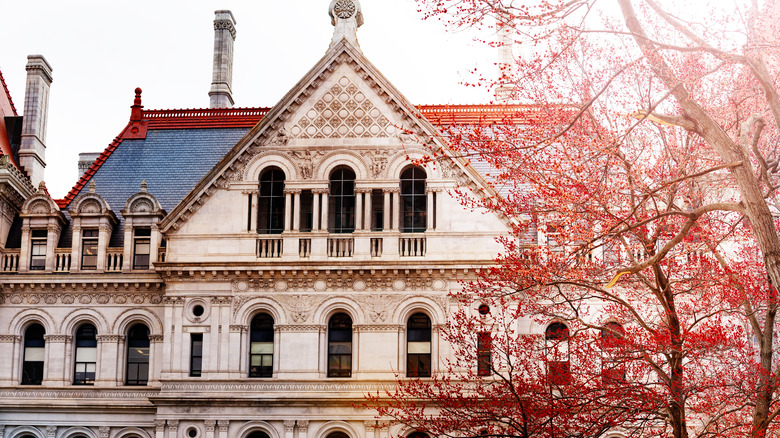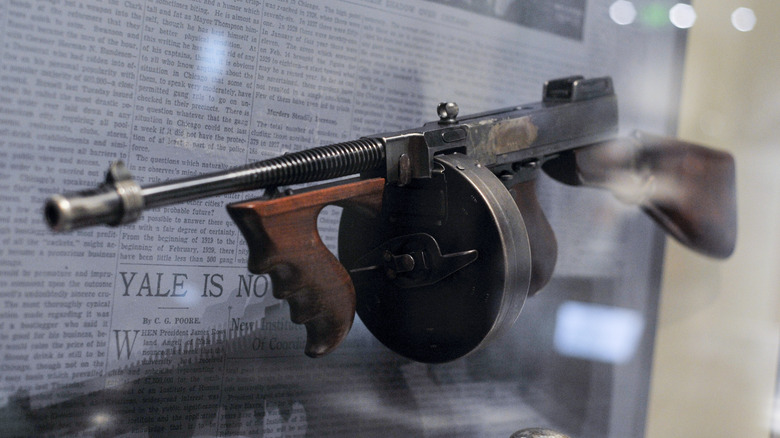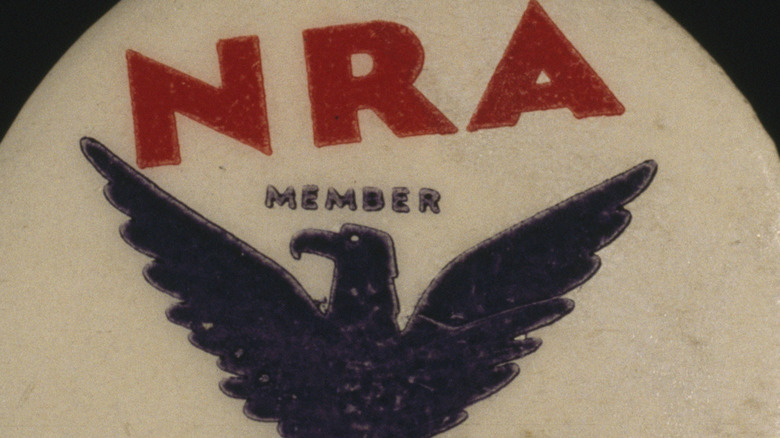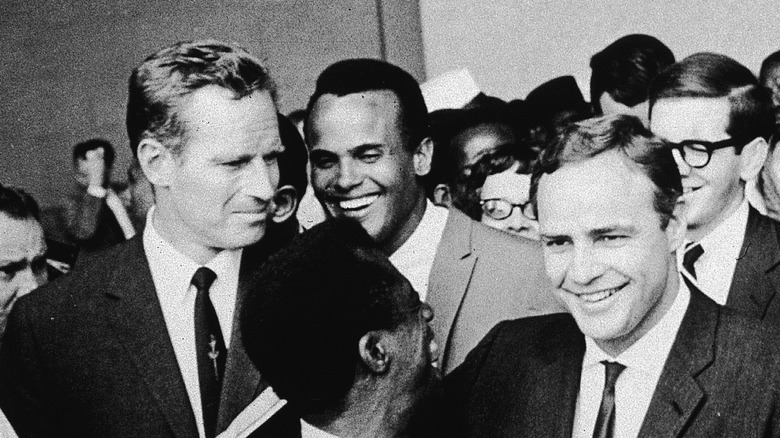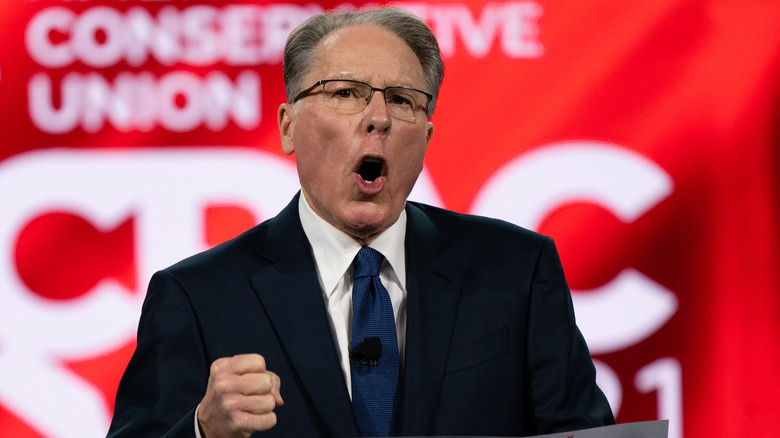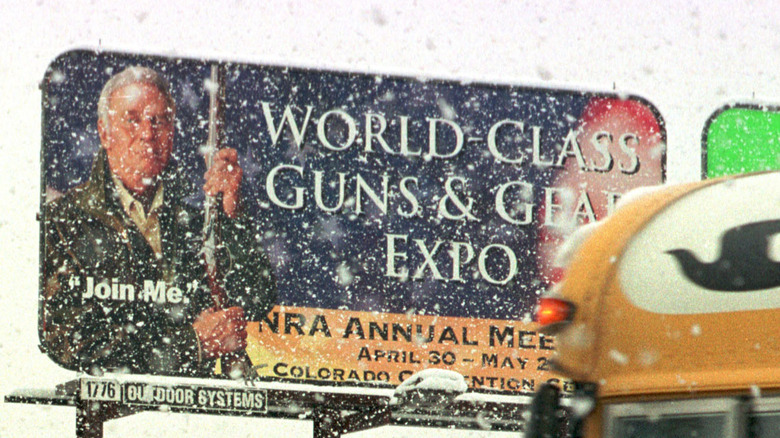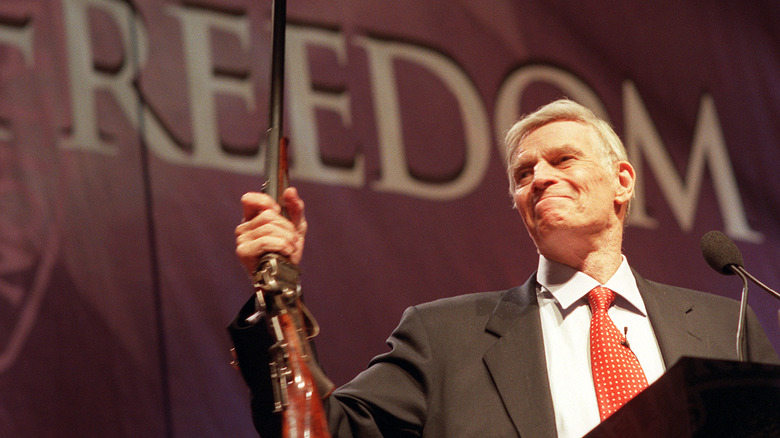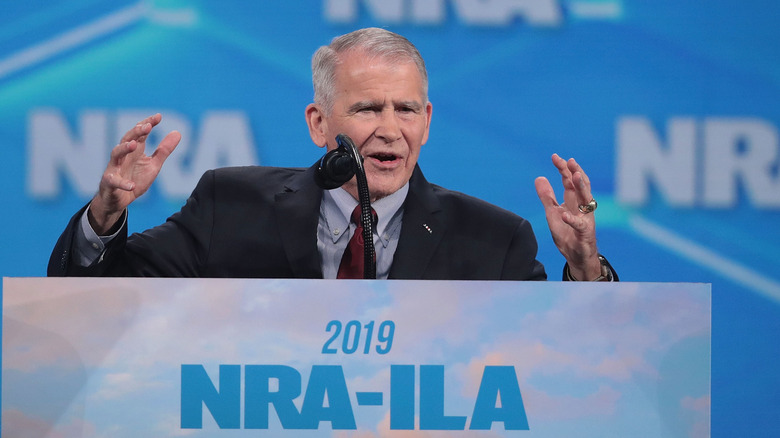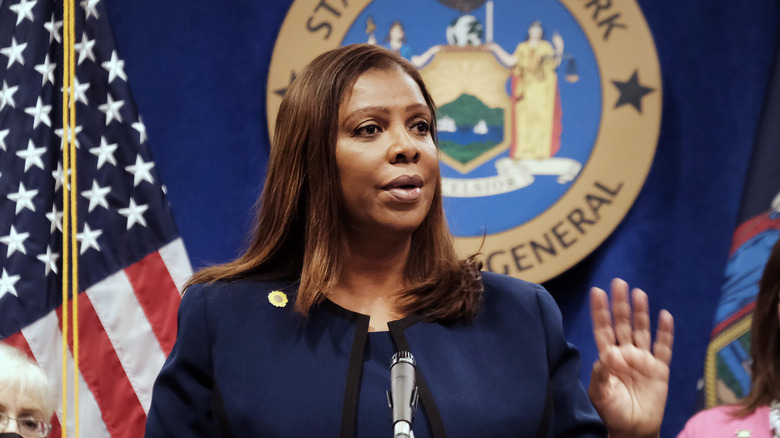The Untold Truth Of The NRA
During the 2020 election season, Robert J. Spitzer opined in The Washington Post that the National Rifle Association was doomed. Financial issues dating back over a decade came to a head with serious accusations of mismanagement and fraud leveled by then-president Oliver North in 2019. The legal challenges against the NRA and its CEO, Wayne LaPierre, remain ongoing as of 2022. Splinter groups have claimed a share of loyalty from firearms enthusiasts, while the NRA's shady money dealings and hard-line against even popular gun safety measures have alienated longtime members and allies (per The Guardian).
But if the NRA as an organization is in a weakened position now compared to just a few years ago, its dark legacy on American politics seems secure. The same inflexibility that's turned some of its members against it has become so ingrained in Republican political life that the ideology arguably carries more strength than the group itself, per The Washington Post. And it may be premature to dismiss the NRA and its clout within Republican circles — Politico notes the high-profile conservative figures attending its annual leadership forum in 2022.
That clear partisan connection, the rigid attitude toward gun control, and its money woes put the modern NRA well at odds with its beginnings. In fact, the group's early identity is unknown even to many of its own members.
It's older than you think
The NRA is keen to present itself as a champion of the Second Amendment. According to Vox, it's more accurate to say that they contributed to a radical push to rethink that piece of the United States Constitution. Either way, the role played by firearms in America's national mythology throughout the 20th century is so great that it may be a surprise to learn that the NRA is, in a sense, an international spin-off from England, and one of considerable vintage.
The British National Rifle Association was founded in 1859, according to its own website, and is registered as a charity in the United Kingdom devoted to improving marksmanship and organizing shooting competitions. It was originally designed around the needs of volunteer groups preparing for a potential invasion by France (per an older archive of the BNRA), and the association's development caught the attention of Americans living abroad in England. A small group wrote a letter to President Abraham Lincoln himself — later published in The New York Times — calling for a comparable organization to be formed after the outbreak of the Civil War.
An American National Rifle Association was eventually granted a charter by New York state in 1971. It was founded by Civil War veterans, and initial membership came from the National Guard (via BBC). The New York Times gave it a modest promotion as a group open to anyone interested in best practices for rifle care and firing.
It wasn't meant as a political organization
The actual care and operation of firearms often seems a secondary concern to the NRA these days. Its political lobbying arm commands much more attention from the press and from lawmakers. But politics and advocacy were not part of the organization's originally intended scope. Its founding members were very much preoccupied with the proper use of firearms, having ample opportunity to observe poor marksmanship during the Civil War (via Vox). They were also concerned with the good training and advancements in weaponry happening in Europe, particularly in Prussia's victories over Austria and France. The NRA, as initially conceived, was meant to help the U.S. military and potential volunteer forces to measure up to those high Prussian standards.
According to Michael Waldman of Bill Moyers, this narrow focus began to shift before the turn of the century, but not toward political lobbying. In the absence of a major war, the need for an auxiliary marksmanship group was less obvious, though the federal government still provided rifles at cost to NRA-approved clubs. Membership within the NRA came to be dominated by recreational hunters, and by the end of World War II, its primary focus in its publications and outreach was sporting activities. In a rare instance where a lobbyist from the organization was asked by Congress to weigh in on a proposed gun control measure from a constitutional perspective, the man offered no opinion.
New York state helped the NRA buy a rifle range
The NRA's recent legal battles have been fought in New York state. While its headquarters is in Virginia, the NRA is chartered in New York (per The Washington Post), putting it within the legal jurisdiction of the state's attorney general. Any attempt to relocate would require approval from the same office — approval that is not likely to be forthcoming in the near future (per Newsweek).
Except for California, it's hard to think of a state with a less hospitable political climate for the NRA than New York, but it wasn't always so. The NRA's own website acknowledges an early instance of cooperation between the organization and the state legislature from 1872. The fledgling group required a training ground, and a family farm in Long island offered a suitable location. The state of New York provided the NRA with financial aid to buy the farm, named Creedmoor for the original family.
Creedmoor became the site of the NRA's title competition for the next 20 years, according to NYC Parks. The group received a significant publicity boost by hosting an international contest with the famed Irish Shooting team in 1873 (per Shooting Illustrated). Eventually, Creedmoor was acquired by the state of New York and then New York City. Now, as a park, the site boasts an operational farm again. Except for some nearby street names, little is left to indicate its connections to the NRA.
It hasn't always opposed gun control
The NRA's hard-line against gun control measures, no matter the number of gun tragedies that strike America or the tide of public sentiment, was not always so unyielding. While Michael Waldman of Bill Moyers states that the NRA has always been hesitant about restrictions on gun ownership, it did not oppose such measures as the National Firearms Act of 1934. The rise of violent crime during Prohibition and the association of such weapons as the Tommy gun with mobsters and bank robbers inspired the law, which mandated gun manufacturers to register with the government and placed restrictions on the ownership of certain classes of firearms (per NPR).
Speaking before Congress at the time of the act's passage, an NRA lobbyist avowed (per NPR): "I do not believe in the general promiscuous toting of guns. I think it should be sharply restricted and only under licenses." Decades later, when President John F. Kennedy was assassinated (with a weapon purchased through an ad in the NRA's American Rifleman magazine), another official for the organization spoke out in favor of proposed gun control measures. This time, however, the bill considered did not become law, as pressure from gun-owning constituents made Congress reconsider. In addition, the spike in violence during the 1960s ultimately played a key role in the NRA's turn toward unflinching opposition to gun control.
A tragedy with a federal agent helped speed the group's shift
In an interview with Vox, author Frank Smyth dates the beginning of the NRA's shift from a marksmanship group to an extreme political organization to 1968. That was the year President Lyndon B. Johnson signed the Gun Control Act into law. The NRA officially supported the measure but successfully lobbied against its inclusion in a national gun registry (per The Buffalo News). This pleased neither the president nor the hard-liners within the NRA who feared the Gun Control Act's perceived threat to gun owners' rights. Feeling scorned by leadership, these individuals worked in the coming years to usurp control over the NRA and remold it in their image.
A key development in that process came in 1971. According to NPR, an NRA member was killed that year following a confrontation with ATF agents over an illegal weapons stockpile. In response, the NRA created the Institute for Legislative Action, a lobbying organization, and placed Harlon Carter as its head. A former Border Patrol agent and lawyer, Carter was among the hardliners who had opposed any support for the Gun Control Act, and his aggressive campaigning for gun rights put him against his parent organization. When the NRA moved to cut the ILA's staff, Carter countered with a campaign at the 1977 convention that elevated him to executive vice president's chair, in effect placing him — and his unbending attitude — in charge of the NRA.
America's oldest civil rights organization?
One of the NRA's favorite descriptions of itself is as "America's longest-standing civil rights organization." It's a boast that can be found on its website, and it is a go-to line for NRA officials and legal counsel (via the San Francisco Examiner). According to Salon, the organization made liberal use of the phrase when promoting its annual convention in 2015, highlighting the link between the NRA's supposed championing of civil rights and its host city of Atlanta, Georgia. There was even a well-circulated (and false) online claim in 2021 that the NRA was formed to help fight the Ku Klux Klan after the Civil War (per AP).
The title of America's oldest civil rights group is not uncontested, however, and the facts do not support the NRA's claim. Both the National Association for the Advancement of Colored People and the National Association of the Deaf have described themselves the same way, with the NAD devoting a page of its website to the matter. While the NRA is technically older than the NAACP and NAD, i's initial founding in 1871 as a group dedicated to marksmanship is well-documented. There was no expressed concern for civil rights or gun rights in its stated aims. The earliest public statement in defense of gun rights from the NRA comes from 1934, and it was only after the rise of Harlon Carter in 1977 (per The Washington Post) that such issues became the NRA's primary focus.
Questionable membership numbers
Go to NRA.org, and at the bottom of the page, there will be a claim that the organization has over 5 million members as of 2022. The same figure would have been there the year before. In fact, according to Newsweek, the NRA has been citing that membership figure since 2013. Beyond that statistic, it hasn't published any membership figures or allowed any independent verification. And the 5 million figure came to prominence suspiciously fast in 2013, mere months after NRA CEO Wayne LaPierre claimed to Congress that his organization had 4.5 million members (for comparison, it took over two years for the NRA to move from citing 4 million members to 4.5 million).
The stagnant number, without verification, has led to some doubt about the size and reach of the NRA. Josh Sugarmann of the Violence Policy Center has accused the group of inflating its roster, taking advantage of brief spikes in membership after well-publicized violent crimes, while former NRA accountant Richard Feldman said that the NRA used creative accounting with lapsed and deceased members to reach a higher number. The group's 990 filings from 2007 to 2016 suggest a significant decline in membership dues collected during that time (per Newsweek). But without independent review, the truth about the NRA's numbers can't be determined through publicly available records.
It had a chance to change course after Columbine
The NRA's decision to press forward with its 2022 convention in Houston, Texas, so soon after the Uvalde shootings (only four hours away, per The Washington Post) invited unfavorable comparisons with its actions after the Columbine High School massacre of 1999. There as well, the organization pressed forward with its convention, which was hosted in Denver that year, very close to the town of Columbine. Significant public rebuke came from state and local officials, including then-mayor Wellington Webb. The NRA shortened the convention and canceled its gun shows for the year, but its response to criticism was defiant.
It was a deliberate strategy, more focused on the NRA than the tragedy, and one the group considered rejecting. In 2021, NPR acquired over two hours of recordings of deliberations by NRA strategists after the Columbine shooting. Those involved in the talks were under no illusions about their situation. "We are in deep s*** on this deal," said official Kayne Robinson, who went on to describe any decision made as "the best of a whole bunch of very, very bad choices." On the table were canceling the convention, providing sympathetic statements to members of Congress, and creating a victims fund for up to $1 million. There was also an expressed fear that any decision would be painted in a negative light by the press, and this perceived hostility was ultimately highlighted in the NRA's response to its critics when it pressed ahead with the convention.
Charlton Heston helped salvage the NRA's image
While the NRA has kept its uncompromising stance on gun control despite the incidence of gun violence in America and significant criticism of the organization, its had to adjust its role in public life and conservative politics. According to author Frank Smyth (via Vox), the NRA's position within the gun rights movement has required it to balance advocacy for weapons ownership with the need to check the overtly racist groups involved with the same issue. In a private debate on how to respond to the Columbine massacre (via NPR), officials worried that the only members who would turn up to the annual convention that year would be the "wackos."
By Smyth's assessment, the NRA has been better able to isolate that contingent of its membership at official events since the 1990s. Helping the group in that effort from 1998 to 2003 was actor Charlton Heston in the role of president. The president of the NRA is largely a ceremonial position (per The Hollywood Reporter), but Heston himself told The Washington Post that he felt his installation was a public relations move after a tumultuous decade. He succeeded Marion Hammer, described by the Post as a "far-right executive," and he brought a personal history as a civil rights campaigner to the job as well as his reputation as an actor. But it was Heston who delivered the infamous declaration in 2000 that the government could take his gun "from my cold, dead hands."
Its current civil war was set off by money
The NRA's recent legal woes don't have anything to do with gun rights or interpretations of the Second Amendment but with money. In 2019, its president, Oliver North, became concerned with possible improprieties that would jeopardize the NRA's nonprofit status. According to The Wall Street Journal, these included over $542,000 billed to Ackerman McQueen — the NRA's public relations firm — by CEO Wayne LaPierre. North moved to establish an independent review of the situation in April of that year, but he was preempted by a letter from LaPierre to the board of directors (via The Washington Post), claiming North wanted to intimidate him into resigning.
Ultimately, it was North who lost his role within the NRA. It was made clear to him that he could not seek a second term as president. In an effective resignation letter read out to the 2019 convention in Indianapolis, North repeated his calls for an investigation and insisted he acted in the organization's best interest. He felt that LaPierre's actions and the financial straits of the NRA threatened its viability. North was not the only one to take an interest in what might be happening with the NRA's money, either. As the conflict between North and LaPierre spilled into the public light, New York State Attorney general Letitia James announced an investigation into the group's finances (per ABC News).
New York has fought to shut the group down
In 2020, following a lengthy investigation, New York State Attorney General Letitia James moved to bring down the NRA, alleging millions of dollars worth of fraud (per NPR). Specific charges included the use of charitable funds by CEO Wayne LaPierre for his own benefit, CFO Woody Phillips arranging a hefty retirement package for himself just before leaving the job, and the certifying of false financial statements. The move for dissolution was the harshest action James could take against the NRA, but she insisted it was necessary. "No organization is above the law," she said in a statement (via NPR).
The dissolution portion of the lawsuit was resolved in March 2022. According to NBC New York, Judge Joel M. Cohen rejected the effort, expressing concerns that such an action would impinge on the First Amendment rights of NRA members. It was also his opinion that the lawsuit James brought did not allege any harm to the public as a result of the alleged misdeeds, nor did the NRA as an organization appear to benefit from the actions of LaPierre and other named parties.
At the same time that he rejected dissolution, however, Cohen also rejected the NRA's motion to dismiss the case, allowing New York state to continue its lawsuit against the organization and against LaPierre and three other executives — legal action that remains ongoing as of May 2022.
